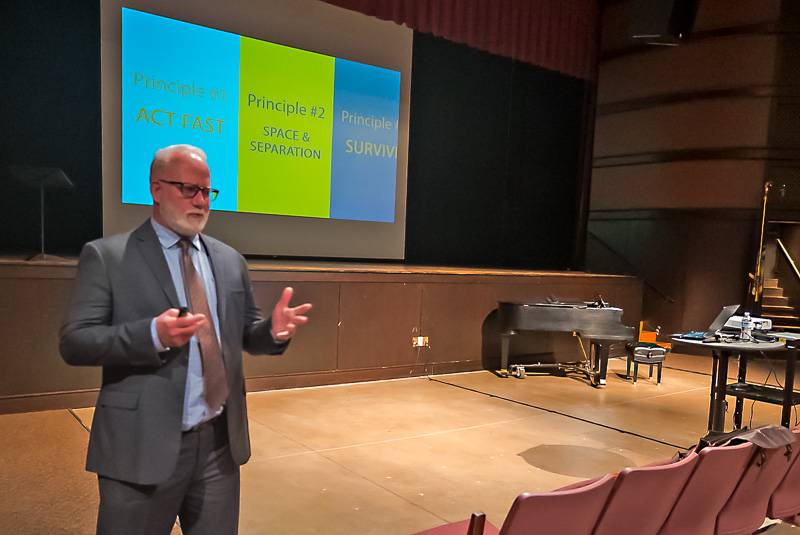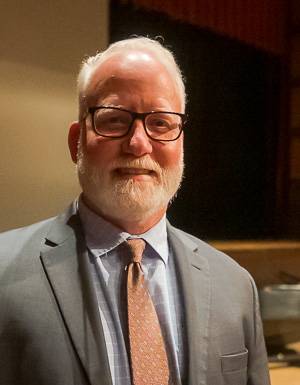
Photo by Howard Owens.
Since it was a small turnout in the Pavilion High School Auditorium on Thursday evening, Don Shomette, a school safety consultant, decided to have a conversation instead of his planned presentation.
He took questions and offered answers.
Those answers included three rules for staying safe if you find yourself in public during a safety crisis, such as an active shooter: act fast, get space and separation, and survive.

"Run, Hide, and fight -- I like it because nobody created it," Shomette said. "It wasn't as if someone sat down and said, 'You know what I'm going to do? I'm gonna go ahead and create a strategy that people can use to make themselves safer. That's not what they did. What happened was we watched a million people react to violence, and we said, 'Oh, everybody does one of three things. They run, hide or fight, or they do a combination of it. What I love about it is all of us will naturally do it."
Shomette is a former Marine, combat veteran, and former school resource officer with more than 30 years of security experience. He has consulted with police departments, municipalities, and school districts nationally. He provided the district with a vulnerability assessment based on personal visits inventorying all aspects of the campuses, as well as staff development training and Thursday's community meeting.
The low turnout for his talk on Thursday -- less than a dozen people -- was actually a good sign, Shomette said. It is a sign there isn't a lot of anxiety about potential violence within the district and that there hasn't been a tragic or troublesome event in the area recently.
Advice for responding to violent acts
As for his advice, if you're in the proximity of violence, acting quickly can help save your life, and the thing you are most likely to think about first is getting away from the violence, Shomette said.
"If you're in a room and you hear what sounds like fireworks or firecrackers, chances are it means that the violence is far away from you, or it's not extremely close to you," Shomette said. "In that case, I would run to the door, close the door, lock the door and get out of the way. I'd stay in the room. Chances are, that might be the best thing to do. Okay, why stay in the room? If you can close and lock a classroom door, you have about a 99 percent chance that no threat will enter the classroom. That is, statistically speaking, what school attackers do is they tend not to destroy doors; they try the handle, and then they move on. So if you're in a classroom and you hear what sounds like firecrackers, my advice to you is if you can get to the door and close and lock it, stay there."
That's creating space - you're putting a physical object between you and the attacker.
If you're in the hallway, he said, you need to create distance. That means running.
"I will say that the vast majority of people who go outside tend to survive," Shomette said.
He cautioned, though, that you want to be sure you're running away from the violence and not toward it.
Prioritizing survival is fighting, Shomette said. You're fighting to survive.
"You have to adopt the mindset right now that you're going to do anything you had to do to survive," he said.
He told the story of two people at a mass shooting who crawled into a hole in the wall that officials couldn't believe one person could fit in, let alone two.
When it comes to fighting back, that is a matter of assessing your situation and understanding what you've trained or practiced to do. Some people are better equipped based on size alone or the equipment they care to provide physical resistance to an attacker. He drew attention to, for example, School Resource Officer Trevor Sherwood, who was in attendance and is a large man, a trained peace officer who, if on campus, is probably properly equipped to fight back.
"Typically, we think of fighting as going physical," Shomette said. "If you can go physical, go physical. Trevor, stand up. I want you to look at Trevor. Trevor should go physical, don't you agree? Thanks, Trevor. I mean, I would bring Trevor with me and put him in a glass cage and just break it and say, Trevor, take care of it. If I told Trevor not to fight or as a last resort fight, it would be crazy because Trevor is trained; it's his natural, probably, proclivity. It's what he's going to be leaning towards."
But not everybody is well suited to taking on an attacker. Most people aren't, in fact. That's where space and distance comes into play, which Shomette said is also fighting because it's about surviving.
"The deal is 99 percent of people do not first think of physically fighting," Shomette said. "They tend to be 1 percent of people who physically fight. So don't be discouraged by this. Everybody fights in a crisis. If you run, you're fighting. If you hide, you're fighting. If you survive, you're fighting.”
Protecting yourself
Since students can't carry pepper spray, one young woman asked about carrying hair spray as a defensive weapon.
That's fine if you're practiced in how you would deploy so that you're ready to react in a tense, life-threatening situation, Shomette said, but space and distance may still be your better option if it is an option.
"I would not, however, bank on the idea that I'm going to do something brand new that I've never done before," Shomette said.
When Shomette was a young police officer, he was provided with pepper spray and not a lot of training or practice time on using it. He was pretty horrible with it as a defensive tool at first, he admitted. One time he accidentally sprayed his partner in the face with it.
"That was the worst feeling in the world, seeing that red go on his face," Shomette said. "I felt very comfortable using it."
He eventually became proficient, but it took time.
He recalled a mass shooting in a bar, where dozens of adult customers were standing around with beer bottles in their hands.
"How many grown-ups threw a bottle at the attacker? None of them," Shomette said. "None of them, and you would think that they would do it. But the deal is when a crisis happens -- here's this part that it's hard to describe, and it's kind of painful to say, but during an extremely violent act, it is unlike anything you've ever experienced. You can you can feel it. You'll feel the vibrations. You can feel things hitting you. You smell things. In extreme violence, you can smell things that you never thought about.
"I look at photos of some things that have happened that I've been involved in, and I still remember what that smelled like. I remembered the smell that was there in extreme violence. I don't know if it's from the room or from the weapons being discharged, but I can remember tasting metal. I look at some photos, and I taste metal. I guess my point is that stay away from extreme violence and get away from it. It is shocking. It is incredibly unnerving. You tend to fall back on the things that you feel most comfortable doing."
Mental health
Shomette started his discussion by sharing his views on the primary cause of mass violence -- mental illness, and the fact that mental health is what society needs to address and what parents need to see as a primary need of their own children.
"There are lots of people who believe what's happening is because of lots of reasons," Shomette said. "I won't go into all the reasons, but they are heavy, big-time debates. ... This is me. My thoughts. The number one problem, or the number one driver for me, about why we have school attacks is because of mental health, hands down. Why do I say this? I just don't say it because I believe it. I study school attackers. I put on classes for police officers that are five days in a row, eight hours a day. All we do is talk about school attackers, who they are, and what they do.
"I'm not trying to be insensitive, but after every school attack, the newspaper could read, 'We have learned nothing new.' We've learned nothing new for the last 10 years. We have known everything about school attackers, there is nothing new. Every time, it's shocking, but there's nothing new. The mental health aspect is, without a doubt -- I think every school attacker suffers from mental health illness because they've had a break with reality and they believe it's okay to take a life. Would you agree that that's totally unhealthy? So I think by the act itself, whether they were diagnosed mentally ill or not, it doesn't matter, in the act of murdering an innocent person, you have proven that you are mentally ill."
Parents, he said, watch your kids and make sure they overcome the barriers they encounter in life and enjoy life.
"Are you ready? I have eight kids," Shomette said. "I am super vigilant, hyper-vigilant. I look at all my kids, and I think about these things on a very personal level. If you live life well, I think you tend not to choose violence. I worry that people who don't live life well long enough, they go down. We make the mistake of just going out there and saying they're mentally ill, but they're really not mentally ill.
“They say that whatever you practice, you become good at whatever it is you practice,” he said. “So, if you have kids, my advice is to do everything you can to help them live well. If kids can live well, I think we'll get rid of most of our issues and problems."
